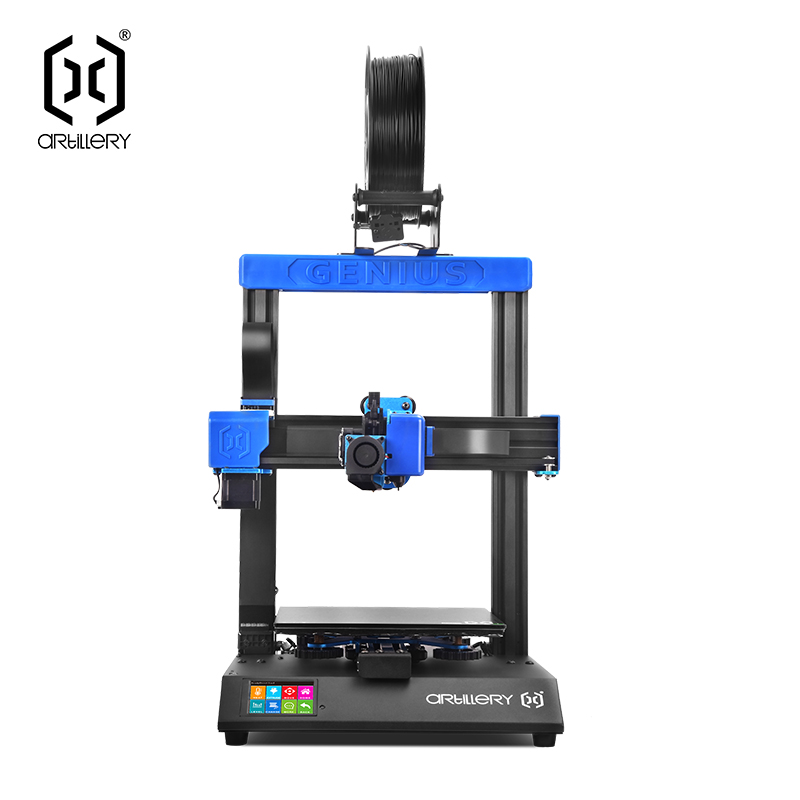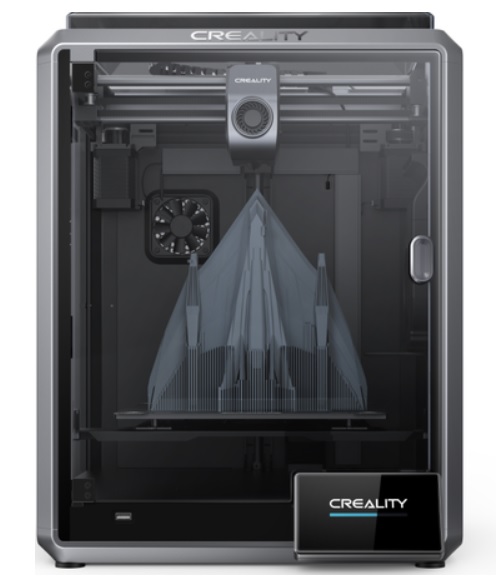Compare Genius Pro vs K1
Comparison between the best 3D printers
Choose the best 3D printer at the best price. The cheapest 3D printers are here.
Buy a 3D printer here with 3D Fila.
 |
 |
|
| Model | Genius Pro[BUY Genius Pro] |
K1[BUY K1] |
| Printing Material | Filament | Filament |
| Buy Filament for Artillery Genius Pro | Buy Filament forCreality 3D K1 | |
| Estimated price | $309,00 | $399,00 |
| Manufacturer | Artillery | Creality 3D |
| Release Year | 2022 | 2023 |
| Print Volume [mm] | 220x220x250 | 220x220x250 |
| Printer Size [mm] | 430x390x590 | 355x355x480 |
| Weight [kg] | 9,6 | 12,5 |
| Power Loss Recovery | YES | YES |
| Enclosed printer | NO | YES |
| Bed Leveling | Automatic | Automatic |
| Filament End Sensor | YES | YES |
| Bed type | Heated | Heated |
| Power supply system | Direct Drive | Direct Drive |
| Standard nozzle | 0,4 | 0,4 |
| Maximum Nozzle Temperature [°C] | 240 | 300 |
| Maximum Bed Temperature [°C] | 120 | 120 |
| Maximum printing speed [mm/s] | 150 | 600 |
| Filament holder | YES | YES |
| Camera for supervision | NO | NO |
| Recommended filaments | PLA, PETG, Tritan, Flex, ABS | ABS, PLA, PETG, PET, TPU, PA, ABS, ASA, PC, PLA-CF, PA-CF, PET-CF |
| Recommended slicers | Cura, Simplify, Slic3r, IdeaMaker | Creality Print; Cura, Simplify3D e PrusaSlicer |
| Maximum Resolution [mm] | 0,1 | 0,1 |
| Processor | Ruby 32bit | |
| Display | Touchscreen TFT 3,5'' | Display touchscreen 4,3'' |
| Power Supply | 110/220V / 350W | |
| Connectivity | SD / USB | Ethernet / USB / Wi-Fi |
| Operating systems | Windows, Mac, Linux | Windows, Mac, Linux |
| Date of registration in the system | 2022-11-07 | 2023-04-17 |
| Release date | 2022 | 2023 |
| Extra features | The Artillery Genius Pro is a standout 3D printer with a fast-heating AC tempered glass print bed and a sleek design with a black aluminum base and blue accents. It features a Titan-style direct extruder and a 32-bit Ruby mainboard. Despite its advanced feature set, it struggles to maintain print quality, requiring frequent adjustments and calibrations, and its glued glass bed makes cleaning and replacement difficult. | The K1 is an extremely fast FDM 3D printer, reaching 600mm/s, 12 times faster than standard models. Equipped with a Core XY system and lightweight print head, it offers energy efficiency and high print quality. It stands out for its dual-gear extruder and quickly heated hotend, as well as dual cooling to prevent warping. Its robust structure ensures stability at high speed, with optimized software to speed up the printing process. |
| Support for multiple colors and materials (AMS and CFS) | NO | NO |
Notes * |
||
| Cost-benefit | 7 / 10 | 8 / 10 |
| Hardware | 2.8 / 10 | 4.8 / 10 |
| Tela | . | . |
| Print volume | 3 / 10 | 3 / 10 |
| Performance | 1 / 10 | 5 / 10 |
| [BUY Genius Pro] | [BUY K1] |
Conclusion |
| In conclusion, the comparison between the Artillery Genius Pro and the Creality 3D K1 reveals distinct advantages and drawbacks for each 3D printer, catering to varying user needs and preferences. The Artillery Genius Pro, priced more affordably, features a simple design and essential functionalities, suitable for users who prioritize ease of use and value for money. However, it suffers from challenges in maintaining print quality, necessitating frequent adjustments and making it less ideal for those seeking consistent, high-quality output. On the other hand, the Creality 3D K1 justifies its higher price point with advanced features and superior performance. Its impressive printing speed of 600mm/s, efficient dual-gear extruder, and robust structural design stand out, making it suitable for users aiming for speed and quality in their printing projects. The enclosed design provides an additional layer of stability, particularly when working with a broader range of materials, which further enhances its versatility. Ultimately, for users focused on budget and simplicity, the Genius Pro remains a compelling option. Those seeking advanced capabilities, speed, and enhanced print quality should consider the K1 as a worthwhile investment. Each printer's offerings reflect its intended audience, making the choice heavily contingent on individual printing needs and budgetary constraints. |

